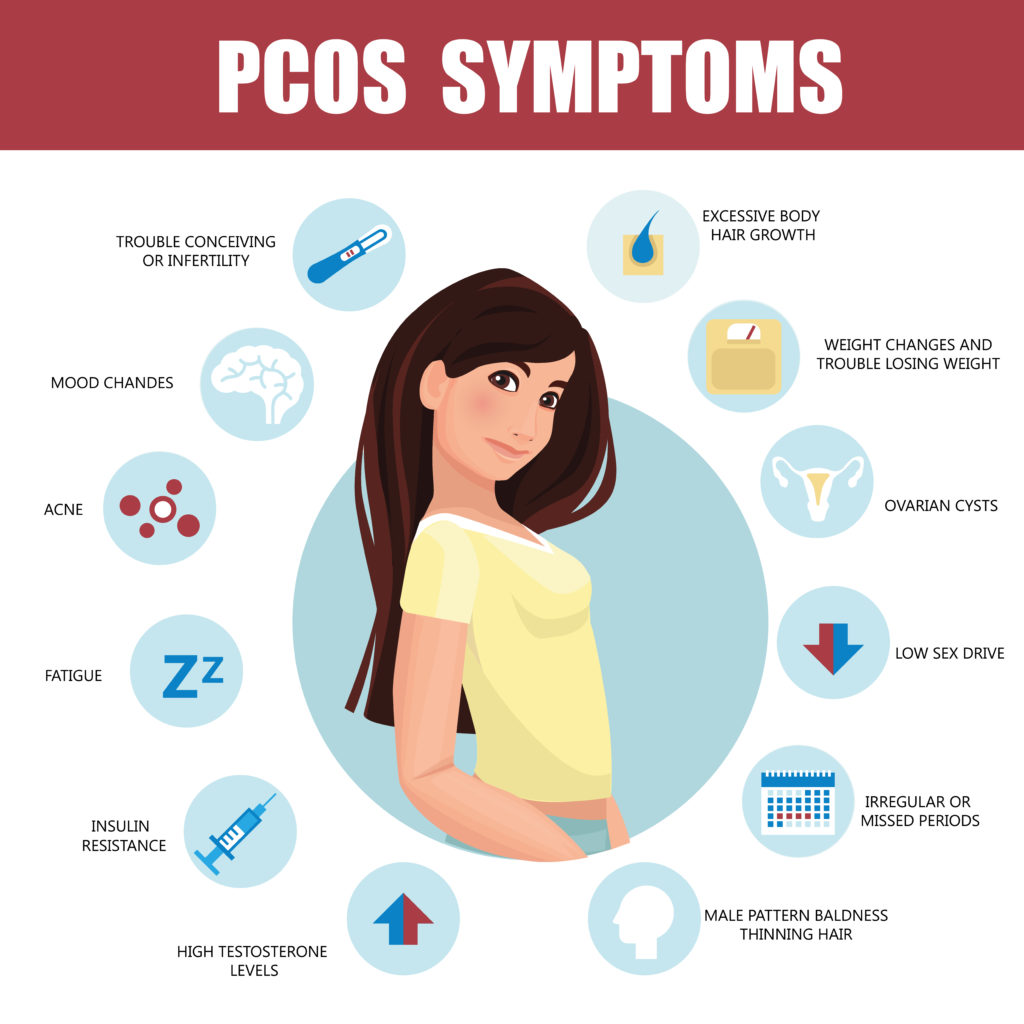 Polycystic Ovarian Syndrome (PCOS) is characterized by multiple hormonal imbalances. The name can be misleading because many with this syndrome do not have ovarian cysts. Women with this condition experience irregular or lack of menses, hyperandrogenism, and potentially early insulin resistance which may lead to Metabolic Syndrome and/or Type 2 Diabetes.
Polycystic Ovarian Syndrome (PCOS) is characterized by multiple hormonal imbalances. The name can be misleading because many with this syndrome do not have ovarian cysts. Women with this condition experience irregular or lack of menses, hyperandrogenism, and potentially early insulin resistance which may lead to Metabolic Syndrome and/or Type 2 Diabetes.
The National Institute of Health states that Polycystic Ovary Syndrome is indicated when there is a chronic abnormality of periods AND high androgen levels are present. Androgens are hormones such as testosterone and DHEA. These are often thought of as male hormones but females have them too, just to a much lesser degree.
Underlying Causes of PCOS
The root cause of PCOS is both hormonal and metabolic. It’s not one particular disease; it’s more a set of symptoms with the common denominator being not able to ovulate regularly. Many of the symptoms or conditions correlate to each other and the worsening of one can cascade into the worsening of others which makes it sometimes difficult to determine what is the cause versus what is the effect.
Some women are genetically predisposed to it, though there is no specific “PCOS gene.” However, studies have shown that genes that can affect hormone levels and Insulin Resistance can be passed down from generation to generation. The University of Alabama at Birmingham found that 24% of women with PCOS had mothers that also had the condition, and 32% of women with PCOS had sisters afflicted with it as well.
 Symptoms and Conditions Associated With PCOS
Symptoms and Conditions Associated With PCOS
- Irregular periods (usually less than 8 per year)
- Absent periods
- Elevated Testosterone/DHEA levels can cause acne, hirsutism (excess body hair), and loss of hair on the scalp
- Insulin Resistance
- Infertility
- Low progesterone levels
- Estrogen dominance
- Hypothyroidism
- Abnormal cholesterol, including high triglycerides
- Prediabetic A1C ranges
- Ovarian cysts
- Sleep apnea
- Skin tags on the armpits and neck area
- Dark patches of thickened skin on neck, arms, breasts, and thighs
- Genetic predisposition
Insulin Resistance
Another common factor of PCOS is a condition called Insulin Resistance. In fact, it’s estimated that up to 70% of women with PCOS have Insulin Resistance. Insulin is a hormone made by the pancreas that is released when food is ingested. Its purpose is to regulate the amount of glucose (blood sugar) in the body by helping glucose get into the cells and organs where it’s used for energy.
When resistance to insulin develops, the body’s cells don’t respond as they should. Glucose stays in the blood rather than getting into the cells so blood sugar rises. More insulin is secreted by the pancreas to get the job done so insulin levels also rise. Insulin Resistance can be a precursor to Metabolic Syndrome and Type 2 Diabetes if it’s not addressed.
Insulin Resistance is also associated with abnormal weight gain, especially around the abdominal area. It can also cause lead to infertility by causing higher levels of androgens which can halt ovulation. When this happens, periods become irregular and may become much lighter or extremely heavy.
Lack of ovulation creates imbalances with estrogen and progesterone and eggs that are produced by the ovaries don’t mature. This can cause fluid to accumulate in the follicles which causes them to become small bubble-like cysts that build upon the ovaries. There is usually no pain associated with the cysts.
Insulin Resistance can also cause inflammation which in and of itself affects normal hormone function, however, with PCOS those effects can be magnified.
Estrogen Dominance
Estrogen Dominance is a condition that occurs when the ratio between estrogen and progesterone is imbalanced. Normally, these two hormones perform a delicate dance together, with estrogen being the “builder” or ‘initiator” and progesterone being the “balancer” or “protector.”
In PCOS, lack of ovulation produces continual levels of estrogen as eggs are released into the follicles, but because the eggs don’t mature, adequate levels of progesterone are not produced. This throws off the ratio between estrogen and progesterone which can contribute to the causation of PCOS and also cause some of the same symptoms including abdominal weight gain, infertility, autoimmune disorders, and thyroid dysfunction. Estrogen dominance also increases the risk of diabetes, cardiovascular disease, and endometrial cancer.
Treatment of PCOS
CONVENTIONAL treatment of PCOS includes prescribing synthetic birth control pills to make periods more “regular.” Statins may be given to control high cholesterol associated with Insulin Resistance, and for a woman trying to become pregnant, fertility drugs are prescribed. Patients are advised to undergo procedures to remove excess body hair.
Lara Briden, ND, who authored a book called The Period Repair Manual, stated, “the conventional treatment of PCOS is to suppress ovulation with the birth control pill. This is a strange approach when you consider that the actual problem is lack of ovulation.”
It’s obvious that conventional treatment of PCOS does nothing to address the root causes of the condition, and in fact, only treats or masks the symptoms. Additionally, valid studies have shown that birth control pills can actually make Insulin Resistance worse, this actually contributing to the causation of PCOS.
Renewed Vitality Treats the Root Causes of PCOS
At Renewed Vitality, we follow a multi-faceted approach. We look at all hormones and balance and optimize them by use of Bioidentical Hormone Replacement Therapy, nutrition, and supplementation with needed nutraceuticals. We did deeper for other underlying associated conditions such as “leaky gut” and chronic infections.
For supplements, we recommend what we call the “Pillars of Health”:
- A good quality multi-vitamin
- Vitamin D3
- Fish oil
- Probiotics
- Magnesium
For PCOS specifically, D-chiro-inositol may be helpful. This supplement has been shown to help treat Metabolic Syndrome. Chromium picolinate and Berberine which help to regulate insulin may be indicated as well before prescribing pharmaceuticals. Depending on lab values, medications prescribed may include Metformin and Spironolactone. These are just a few examples as many other options are available to consider.
We discuss ways to improve/nutrition/diet and how to also address Insulin Resistance with exercise. According to The American College of Obstetrics and Gynecologists, losing just 5% of your body weight can make you much more sensitive to insulin which can lead to more regular periods and reduce androgen levels.
We also educate you and thus, empower you on taking back your health by discussing:
- Ways to reduce and manage stress
- How to lower the inflammation burden
- Ways to reduce oxidative stress on the body
- How to achieve peaceful and restful sleep
- Conversations on venues to bring balance back to mind, body, and spirit
At Renewed Vitality, we believe in the power of evidence-based practice medicine in which individualized treatment is key to the success and achievement of good health and quality of life.
Our patients experience great improvement over time as they follow the treatment prescribed and the lifestyle changes recommended.
Free Phone Consultation with our New Patient Coordinator
Renewed Vitality is a place of hope. Our knowledgeable providers are experts in their field and take the time to find the underlying causes of hormonal imbalances and illness. We will work with you using proven, scientific-based technology, in a warm and compassionate environment, to help you restore your health so that you can live a life of vitality and wellness.
Please contact our New Patient Coordinator for your Free Phone Consultation. She can answer any questions or concerns that you may have and give you additional information about our providers, our protocols and fees, what is covered by insurance and what is not, and any other details you may need. She can also get you booked for your first appointments if you decide we are a good fit for you. There are no obligations to book an appointment.
Please call 214-740-4703 to learn more, or complete the form below, and we will contact you. We would love to hear from you!
